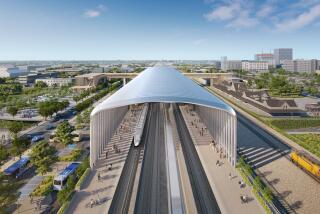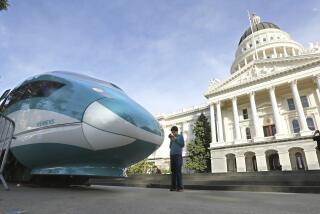Clinton to Propose Faster Production of C-17 Cargo Jet
President Clinton today will propose a speedup in production of the McDonnell Douglas C-17 military cargo jet, a move that would add 2,300 jobs to the company’s Southern California work force, The Times learned Thursday.
Clinton, who two weeks ago stunned Southern California by calling for an end to the B-2 bomber program, plans to personally make the announcement during a visit to the main C-17 plant in Long Beach, a senior White House official said. The change would be subject to congressional approval.
The announcement will embellish Clinton’s welcome in Long Beach, a community that has suffered massive job losses through military cutbacks but has lately had good news from the C-17 program. The administration had recently decided to buy 80 additional C-17s--besides the 40 ordered earlier--at a cost of $17 billion.
Clinton’s Long Beach appearance, before a meeting with Japanese Prime Minister Ryutaro Hashimoto tonight in Santa Monica, offers the perfect exposure for a president preparing his reelection bid, especially because California and its 54 electoral votes are crucial to a candidate’s victory.
*
“Clinton is looking to Long Beach and saying, ‘Here is a town where I can go and talk about something good,’ ” said Jeff Adler, a political consultant in Long Beach.
And the converse is why Clinton does not plan to tour Palmdale or Pico Rivera--cities where there is little cheering to be heard. Clinton two weeks ago decided against buying any more B-2 stealth bombers, which are built in Palmdale and Pico Rivera and support 25,000 Southern California jobs overall.
Indeed, the C-17 and the B-2 stand in bold contrast as tough choices Clinton has had to make at a time when Defense Department budgets are shrinking--and when there are huge political stakes riding on each of those decisions.
The White House knows that canceling any multibillion-dollar program, such as Northrop Grumman Corp.’s B-2 bomber, is politically unpopular. “There’re at least 4,000 people who work in Pico Rivera who will remember,” said John G. Chavez, a member of the City Council there.
But Clinton also had to contend with Pentagon officers who vehemently protested buying any more of the batwing bombers, of which 20 are already being built at a cost of $44 billion. In the end, he chose not to provide any B-2 funds in next year’s budget no matter the political liability.
It is a liability Clinton is confident he can absorb, partly because he’s simultaneously endorsing the C-17 and all of the jobs it supports in California, said Caspar W. Weinberger, former defense secretary under President Reagan and a B-2 supporter.
“Mr. Clinton never takes something away from someone without offering them a half of something else,” said Weinberger, now chairman of Forbes magazine.
But it remains to be seen whether a B-2 backlash will be enough to affect Clinton’s ability to carry California in the election.
“Clearly there will be a fallout. . . . Those affected by the cancellation of the B-2 will be much more likely to vote against President Clinton,” said Michael A. Genovese, a political science professor at Loyola Marymount University and author of the book “The Presidency in an Age of Limits.”
But, Genovese said, Clinton “has so many other things going for him in California”--including a rebounding state economy and polls showing him leading Republican hopefuls--”that it might not have that much of a negative impact.”
Others aren’t so sure.
David Ellis, a Republican political consultant in Newport Beach, said the B-2 is “going to hurt him, especially among the bloc of voters he needs to get, which are the blue-collar, Reagan Democrats. Rosie the Riveter is going to take a long, hard look at Clinton over this decision.”
Linda Sullins, a planner on the B-2 program, is among those upset with the president.
As she stood outside Northrop Grumman’s Palmdale plant Thursday, Sullins urged him to reconsider his decision. At that moment a B-2 flew overhead; she looked up at the black bomber and said of Clinton: “He’s trying to take it all away.”
It’s a much brighter scene in Long Beach, however. The faster schedule for the C-17 means McDonnell will need about 10,700 workers at its plants there and in Huntington Beach and Monrovia in the next three years. That compares with a work force of 8,400 currently. Including suppliers and other vendors, the program supports about 18,000 Southern California jobs.
McDonnell Douglas declined to comment.
*
But the White House senior official said the administration will ask Congress for a contract that would fund production of the next 80 C-17s over seven years instead of about 10, as originally envisioned.
The Pentagon typically issues a separate contract for each year of production. The accelerated C-17 contract would be the largest and longest-running multiyear contract in Defense Department history, he said.
McDonnell would produce a peak of 15 aircraft per year under the contract, substantially higher than the current rate. The plan is expected to save the Pentagon $893 million, since faster production is more efficient and allows McDonnell to buy parts more economically.
A multiyear contract, however, is a two-edged sword. While it creates more jobs in the short run--the 2,300 new jobs would be added by 2000--it also means programs come to an end sooner. Instead of the McDonnell program’s lasting a decade with somewhat fewer jobs, it would end in seven years, unless the company wins new commercial or foreign orders.
Clinton is also expected to announce today that the Pentagon is issuing a $1.87-billion contract for the completion of the first 40 C-17s at McDonnell, a routine annual award that was expected. The Pentagon plans to buy a total of 120 C-17s.
Peltz reported from Los Angeles and Vartabedian from Washington. Times correspondent Danica Kirka in Palmdale contributed to this report.
More to Read
Inside the business of entertainment
The Wide Shot brings you news, analysis and insights on everything from streaming wars to production — and what it all means for the future.
You may occasionally receive promotional content from the Los Angeles Times.










